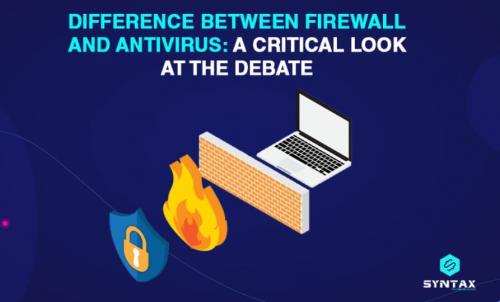Let's Find the Difference between Firewall and Antivirus

What would
be your strongest defence against an assault? Your response, I'm confident,
will be based on the type of attack being made as well as your comprehension of
the best defensive plan to stop it. The field of cyber security is similarly
relevant. Given the broad scope of the industry, there are many different kinds
of cyberattacks and threats. Learn more about cyber security with the best
cyber security books. In light of this, it's critical to have defences that
can respond appropriately to various threats. At this point, the debate over
firewall vs antivirus is crucial. Despite the fact that both tools aid in
assuring security, they approach the problem in different ways. Consequently,
the difference between Antivirus and Network Firewall must be carefully
considered because it is extremely real.
Difference between Firewall and Antivirus: A deep analysis
In this article,
we'll try to examine the difference
between Firewall and Antivirus by comprehending the underlying
concepts of each. Additionally, we'll attempt to handle the conflict of
Antivirus vs Firewall with a comprehensive comparison table in an effort
to make things simpler.
What is Firewall?
A firewall
acts as a barrier between a LAN and the Internet (internal network and incoming
traffic from external sources). It works at a network's perimeter, monitoring
network traffic and preventing hostile traffic such as malware, viruses, worms,
and other threats. It assists in controlling both incoming and outgoing network
traffic. By building a barrier against potential assaults, firewalls can be
considered a very complete form of cyber protection that can be used to cover a
network of computers as well as the entire system of architecture and
configuration.
Functions of Firewall
·
Packet
filtering is done by ensuring that network traffic can pass through the
firewall from the outside to the inside and vice versa.
·
detection
and blocking of unauthorised access attempts
·
Performs
the task of Packet Filtering
Advantages of Firewall
·
Data
Security
·
Protect
from Hackers
·
Observes
Network Activity and Provides Security
What is Antivirus?
The main
difference between antivirus and firewall is that antivirus is essential in
fulfilling the demands of cyber security while firewall falls short in
achieving the same.
An antivirus
is a piece of software that is placed on a system to help deal with various
threats that could jeopardise the network or system's security. These dangers
can take the shape of spyware, Trojan horses, worms, viruses, malware, or any
other dangerous or dubious entity that has the ability to compromise the
system's security.
Functions of Antivirus
Detection: A vital function of an antivirus
programme is to spot potential dangers, viruses, or even efforts to install
malware on the system.
Identification: After a specific infection is
discovered, the antivirus works to pinpoint its sort, kind, and traits.
Removal: Using this feature, the antivirus
makes an attempt to delete the suspicious object from the computer. In order to
restore the original backup software or file, it aims to remove and destroy the
infected file.
Advantages of Antivirus
·
It
provides defence against viruses and other types of harmful threats.
·
It
assists in blocking risky advertisements and spam websites.
·
It
aids in safeguarding sensitive personal data.
·
An
effective defence against the actions of hackers and cybercriminals can be
provided by antivirus software.
What is the Difference between Firewall and Antivirus?
The conflict of Antivirus vs firewall is one between
security and restraint.
Firewalls
aid in network traffic regulation by monitoring it for potential signs of dangerous
viruses and other hazards. However, in addition to network traffic, these
suspicious bodies might also enter your system through other channels. This is
where antivirus software plays a crucial role. Antivirus aids in eradicating
and further isolating any potentially corrupt and infected files by scanning
all new entrants into the system. Additionally, firewalls merely deter and
hinder online attacks, while antivirus software eliminates them to boost
overall protection.
Difference between Antivirus and Firewall in terms of their
Basic Concept
However, the
main purpose of a firewall is to protect both public and private networks from
potential security threats and assaults. In contrast, an antivirus is a piece
of software that essentially defends the system from inside danger.
Divergence in Objective (firewall vs antivirus)
An antivirus program's goal is to find, identify, scan, stop, block, and delete corrupted and harmful applications and files. The goal of a firewall is to check the data flow from the Internet to the systems and prevent any unwanted access by doing so.
Conclusion
It is clear
that the firewall vs antivirus debate does not always pit one technology
against the other. To assert that one is fundamentally superior to the other in
every way would be naïve. Both Cyber Security systems have diverse goals and
are designed to meet various security requirements. As a result, the main
difference between firewall and antivirus are their underlying principles
and the many types of security that they each offer.
At Syntax Technologies, we entice you with
the opportunity to become an expert in cyber security and advance your
professional career.
Source: Difference
between Firewall and Antivirus
Post Your Ad Here
Comments